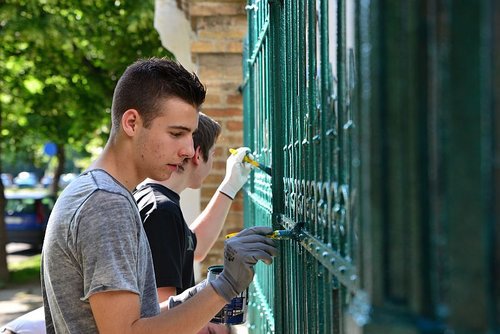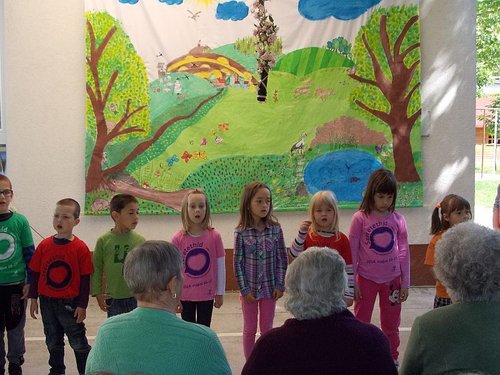More than seventeen thousand volunteers carried out tasks for more than one hundred thousand work-hours on the last weekend of May at the Bridge of Love, organized by the Hungarian Reformed Church Aid.
Bridge of love is a weekend of volunteering, a programme of the Hungarian Reformed Church Aid that has been taking place annually for the last 7 years in the Carpathian Basin, the young and old alike are motivated to join the initiative. More than seventeen thousand volunteers carried out tasks for more than one hundred thousand work-hours on the last weekend of May. Their work in financial terms can be estimated at about ten million, but what is more important than this, is the blessing that is displayed in the community.
Baja, Békés, Bodrogolaszi, Csengersima, Csicsó, Dunaszekcső, Foktő, Gyula, Kálnok, Kalotaszentkirály, Kaposvár, Nekézseny, Pósalaka, Rimaszombat, Sarkad, Sellye, Somorja, Szabolcsveresmart, Szádalmás, Szekszárd…regions (only just a part of the list) that are at on the Bridge of Love List. As many locations and communities, there were so many more faces that tuned others into the love of Christ, on the 29th and 30th May.
Sensitising the Society
It was the first time that Deáki and Labmóc joined in, but Angyalföld and Budafok have taken part for many years in the Bridge of Love May programme. In Debrecen they distributed cakes and pastries, with the volunteers arriving at a number of places in the Heritage Tram and in the same way Negyeden, Nyírmeggyesen and Tuzséron starting off the day’s work with morning devotion. In the programme, every generation was stirred up to help, with the youngest volunteer barely a year old and the oldest being over eighty years old.

The more often than not, congregations were motivated, so that their churches, cemeteries, play grounds can be primped, through local governments, parent associations they cleaned up their public places, they beautified their schools and/or kindergarten grounds, however the most popular choice was the visiting of elderly. From Aba in Hungary through Kisgéres in Slovakia all the way to Révkomárom also in Slovakia, they looked for lonely or those who live in old people’s homes. After listening to their favourite programmes, and their interests met, they could converse a little with the young people which “warmed up” the hearts of the elderly. The Transylvanian YMCA Group from Cluj (Kolozsvár) in the same area, but in a different mode, in that they did not bring experiences within the walls of Elderly People’s Homes but took the residents of the home out for a walk.
The Hungarian Reformed Church Aid placed an emphasis on working among people living with disabilities. The members of the Rotary Club Debrecen (1911 District) cooked and distributed a warm meal to the homeless, while the volunteers of the Kazincbarciaka Reformed Congregation cooked gulylás soup in cauldron for homeless including those in shelters. Pupils from Budakoki Reformed Primary School and students from Károli Gáspár Reformed University got to became acquainted with people with disabilities and helped each of them according to their needs.
Excellent days, distinguished tasks
The Bridge of Love dates had more memories, excellent day and close events, activities full of a combination of these things just as the organisers thought. Inmates of the Budapest Penitentiary and Prison also volunteered their time, they collected rubbish, mowed grass to prepare the grounds for National Prayer Day for the Detained that was held on the 11th June.
The last Sunday in May is Heroes Remembrance Day, in Szolnok and Debrecen the volunteers also cared for Military graves. The students collected fallen branches, foliage, raked up the graves, paths, and got rid of weeds.
Hungarian Health Day is June 1st due to this in many cities, volunteers wearing Bridge of Love t-shirts visited the sick in various hospitals. In Budapest, for example, this began at Bethesda Children’s hospital, where volunteer artists sang, read to the little patients, with some painting cartoon characters on the walls of the cold plain walled corridor. While at the National Institute of Rheumatology and Physiotherapy volunteers help to clean wards, and spread beds, and in many places the sick took with them the joy that the volunteers brought in with them. In the capital city at Saint Imre Hospital, the colleagues and caregivers listened to the “God bless you graciously from Zion…” titled song, of which they showed appreciation with words and teary eyes.
Several congregations for example in Magyarcsanád for organised a program for Hungarian Children’s Day, while Hidaskürt Technical College Students visited the Nagymegyer Kindergarten pupils. It was not only their courtyard that they put in order, but they also surprised the Squirrel Group members with toys and fruits in addition to which they escorted them to a nearby playground. The students of Wáli István Roma Technical Boarding School carried out similar tasks at the Light of the World afterschool programme where they magically excited the children. The students for years past have volunteered among underprivileged children and self-contained afternoon programme.
Hungarian and beyond the border Hungarian Reformed for years past work together in this time, Sub Carpathia, Transylvania, and Királyhágómellék, had the Bridge of Love Programme running in various districts with more than three thousand volunteers registering in Slovakia. In addition, they gave helping hands each other among living congregations in various parts of the country.

The members of Buda Reformed Parish were able to help the Emmaus Children’s home in Marosvásárhely with the proceeds from their Charity Ball, where they painted the equipment on the playground and also made some blankets for the children. While the parents and children from Budafoki donated dry foodstuffs to the Hungarians facing hardships in Sub Carpathia Ukraine. Dutch and Debrecen volunteers spent a week across the border in Bihrvadja redecorating the diaconal kitchen.
It is symbolic that the Bridge of Love took place between the Day of Unity of the Hungarian Reformed Community (22 May) and the Day of National Unity (4 June).
Beyond numbers
Of course, you can volunteer all year round, a good example of this is in Orosháza where they advertised the Bridge of Love for free or Bokonszegi Congregation where they cleaned up the area around the church before Easter, and even after the Bridge of Love they have continued to plan such programmes. The Nagykárolyi Primary School pupils long before the event were nervously preparing handmade gifts for the residents of the State Elderly People’s Home which they took to them on Pentecost Monday.
The work of the Bridge of Love last year was completed by fifteen thousand volunteers and about 58 million Hungarian Forints were spent. This year the numbers continued to grow. However the joy that is shared is more important, this is what a teacher Rita Ambrus Huszár experienced when a few days before the Bridge of Love one of her students read a message from the message wall, “You have not yet lived, until you have done good to for someone who is not able to give back to you. This is because that is why volunteer work is good because we can do a deed that we have never done before, that when we see a smile on another person’s face, we can be happy with them.”
Many are grateful for those “that heard the call and came.” Grateful for their, “zeal to work, cheerfulness, portable tools, and raw materials.” The eyes of women are grateful, that have seen things done, where “there was nothing.” Grateful “for the deeds, for the care they gave, for the countless gifts.” “One of the volunteers form Kamocsa wrote ‘God Bless you’, at the end of their summary of the event, and we from Bridge of Love would also like to wish you the same, that in your service you may experience a sprout of the seed that has been planted in your heart, that it may find soil and it may grow and bring forth new life. My we become moulded in a way that, it may become easier for us to step out of our comfort zone and walk in the footsteps of Jesus…”
Written by György Feke, reformatus.hu
Translated by Njeri Wagana Hughes